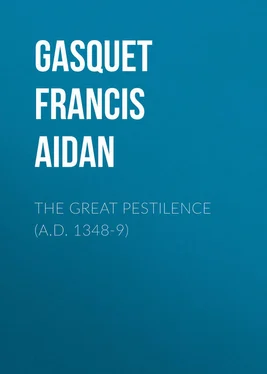Francis Gasquet - The Great Pestilence (A.D. 1348-9)
Здесь есть возможность читать онлайн «Francis Gasquet - The Great Pestilence (A.D. 1348-9)» — ознакомительный отрывок электронной книги совершенно бесплатно, а после прочтения отрывка купить полную версию. В некоторых случаях можно слушать аудио, скачать через торрент в формате fb2 и присутствует краткое содержание. Жанр: foreign_antique, foreign_prose, на английском языке. Описание произведения, (предисловие) а так же отзывы посетителей доступны на портале библиотеки ЛибКат.
- Название:The Great Pestilence (A.D. 1348-9)
- Автор:
- Жанр:
- Год:неизвестен
- ISBN:нет данных
- Рейтинг книги:5 / 5. Голосов: 1
-
Избранное:Добавить в избранное
- Отзывы:
-
Ваша оценка:
- 100
- 1
- 2
- 3
- 4
- 5
The Great Pestilence (A.D. 1348-9): краткое содержание, описание и аннотация
Предлагаем к чтению аннотацию, описание, краткое содержание или предисловие (зависит от того, что написал сам автор книги «The Great Pestilence (A.D. 1348-9)»). Если вы не нашли необходимую информацию о книге — напишите в комментариях, мы постараемся отыскать её.
The Great Pestilence (A.D. 1348-9) — читать онлайн ознакомительный отрывок
Ниже представлен текст книги, разбитый по страницам. Система сохранения места последней прочитанной страницы, позволяет с удобством читать онлайн бесплатно книгу «The Great Pestilence (A.D. 1348-9)», без необходимости каждый раз заново искать на чём Вы остановились. Поставьте закладку, и сможете в любой момент перейти на страницу, на которой закончили чтение.
Интервал:
Закладка:
"At this time," says a chronicle of Prague, "some students, coming from Bologna into Bohemia, saw that in most of the cities and castles they passed through few remained alive, and in some all were dead. In many houses also those who had escaped with their lives were so weakened by the sickness that one could not give another a draught of water, nor help him in any way, and so passed their time in great affliction and distress. Priests, too, ministering the sacraments, and doctors medicines, to the sick were infected by them and died, and so many passed out of this life without confession or the sacraments of the Church, as the priests were dead. There were generally made great, broad and deep pits in which the bodies of the dead were buried. In many places, too, the air was more infected and more deadly than poisoned food, from the corruption of the corpses, since there was no one left to bury them. Of the foresaid students, moreover, only one returned to Bohemia, and his companions all died on the journey." 45 45 Chronicon Pragense , ed. Loserth in Fontes rerum Austriacarum , Scriptores , vol. i, p. 395.
CHAPTER III.
PROGRESS OF THE PLAGUE IN FRANCE
Almost simultaneously with the outbreak of the pestilence in Italy it obtained a foothold in the South of France. According to a contemporary account, written at Avignon in 1348, the disease was brought into Marseilles by one of the three Genoese ships, which had been compelled to leave the port of Genoa when the inhabitants discovered that by their means the dreaded plague had already commenced its ravages in their city. It would consequently appear most likely that the mortality began in Marseilles somewhere about the first days of January, 1348, although one account places the commencement of the sickness as early as All Saints' Day (November 1), 1347. 46 46 Labbe, Nova Bibliotheca Manuscriptorum , i, p. 343.
The number of deaths in this great southern port of France fully equalled that of the populous cities of Italy. In a month the sickness is said to have carried off 57,000 of the inhabitants of Marseilles and its neighbourhood. 47 47 C. Anglada, Étude sur les Maladies Éteintes , p. 432.
One chronicle says that "the Bishop, with the entire chapter of the cathedral, and nearly all the friars, Preachers and Minorites, together with two-thirds of the inhabitants, perished" at this time; and adds that upon the sea might be seen ships, laden with merchandise, driven about hither and thither by the waves, the steersman and every sailor having been carried off by the disease. 48 48 Matthias Nuewenburgensis in Boehmer, Fontes rerum Germanicarum , iv, p. 261.
Another, speaking of Marseilles after the pestilence had passed, says that "so many died that it remained like an uninhabited place." 49 49 Henricus Rebdorfensis, Ibid. , p. 560. Another account speaks of Marseilles remaining afterwards almost "depopulated," and of "thousands dying in the adjoining towns" ( Chronicon Pragense , in Fontes rerum Austriacarum , Scriptores , i, p. 395).
It is of interest to record that amongst the survivors there was an English doctor, William Grisant, of Merton College, Oxford. He had studied medicine at the then celebrated school of Montpellier, and was in practice at Marseilles during the visitation of the great plague of 1348, dying two years later, in 1350. 50 50 J. Astruc, Histoire de la Faculté de Médecine de Montpellier (Montpellier, 1862), p. 184.
At Montpellier the ravages were, if possible, even greater. Of the twelve magistrates, or consuls, ten died, and in the numerous monasteries scarcely one religious was spared. The Dominicans here were very numerous, numbering some 140 members, and of these seven only are said to have been left alive. 51 51 Anglada, ut supra , p. 432.
Simon de Covino, a doctor, of Paris, who probably witnessed the course of the disease at Montpellier, wrote an account of his experiences in a poetical form in 1350. The moral of his verse is the same as Boccaccio's, and the chief interest lies in the fact that, like the Italian poet, Covino was an eye-witness of what he relates, whilst his medical training makes his testimony as to the chief characteristics of the disease specially important. The name he gives to the malady is the pestis inguinaria , or bubonic plague of the East. He describes a burning pain, beginning under the arms, or in the groin, and extending to the regions of the heart. A mortal fever then spread to the vital parts; the heart, lungs, and breathing passages were chiefly affected, the strength fell quickly, and the person so stricken was unable to fight any length of time against the poison.
One very singular effect of the disease is noted by the author: – "The pestilence," he asserts, "stamped itself upon the entire population. Faces became pale, and the doom which threatened the people was marked upon their foreheads. It was only necessary to look into the countenances of men and women to read there recorded the blow which was about to fall; a marked pallor announced the approach of the enemy, and before the fatal day the sentence of death was written unmistakably on the face of the victims. No climate appeared to have any effect upon the strange malady. It appeared to be stayed neither by heat nor cold. High and healthy situations were as much subject to it as damp and low places. It spread during the colder season of winter as rapidly as in the heat of the summer months."
About the contagious nature of the epidemic there could be no doubt. "It has been proved," wrote Covino, "that when it once entered a house scarcely one of those who dwelt in it escaped." The contagion was so great that one sick person, so to speak, would "infect the whole world." "A touch, even a breath, was sufficient to transmit the malady." Those who were obliged to render ordinary assistance to the sick fell victims. "It happened also that priests, those sacred physicians of souls, were seized by the plague whilst administering spiritual aid; and often by a single touch, or a single breath of the plague-stricken, they perished even before the sick person they had come to assist." Clothes were justly regarded as infected, and even the furniture of houses attacked was suspected. At Montpellier, at the time of the visitation, the writer says there were more doctors than elsewhere, but hardly one escaped the infection, and this even although it was recognised that medical skill was of little or no avail.
According to the experience of this Montpellier doctor the mortality was greatest among the poor, because their hard lives and their poverty rendered them more susceptible to the deadly infection, and their condition did not enable them to combat it with the chances of success possessed by the well-to-do classes. As to the extent of the mortality, he says "that the number of those swept away was greater than those left alive; cities are now ( i. e. , 1350) depopulated, thousands of houses are locked up, thousands stand with their doors wide open, their owners and those who dwelt in them having been swept away." Lastly, this writer bears testimony to the baneful effect the scourge had upon the morals of those who had been spared. Such visitations, he thinks, must always exercise the most lowering influence upon the general virtue of the world. 52 52 Opuscule relatif à la peste de 1348, composé par un contemporain in Bibliothèque de l'École des Chartes , 1e Sér., ii, pp. 201–243.
From Marseilles the epidemic quickly spread northwards up the Rhone valley, and in a westerly direction through Languedoc. Montpellier, too, quickly passed on the infection. It commenced at Narbonne in the first week of Lent, 1348, and is said to have carried off 30,000 of the inhabitants. Indeed, so fearful was the visitation, that this ancient city is reported never to have recovered from the desolation it caused. 53 53 Martin, Histoire de France (4th ed.), v, p. 109.
Интервал:
Закладка:
Похожие книги на «The Great Pestilence (A.D. 1348-9)»
Представляем Вашему вниманию похожие книги на «The Great Pestilence (A.D. 1348-9)» списком для выбора. Мы отобрали схожую по названию и смыслу литературу в надежде предоставить читателям больше вариантов отыскать новые, интересные, ещё непрочитанные произведения.
Обсуждение, отзывы о книге «The Great Pestilence (A.D. 1348-9)» и просто собственные мнения читателей. Оставьте ваши комментарии, напишите, что Вы думаете о произведении, его смысле или главных героях. Укажите что конкретно понравилось, а что нет, и почему Вы так считаете.












